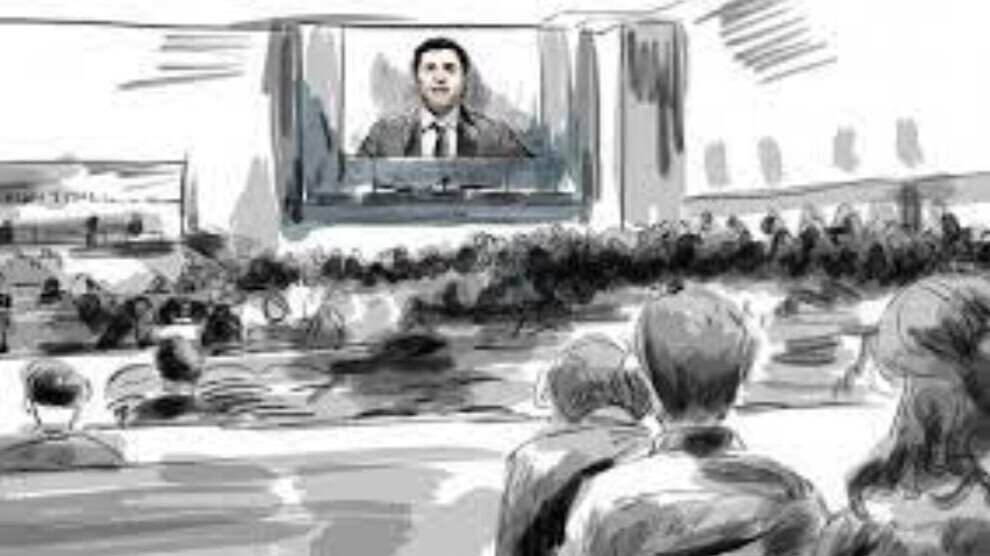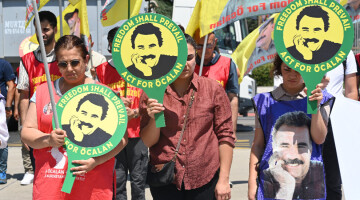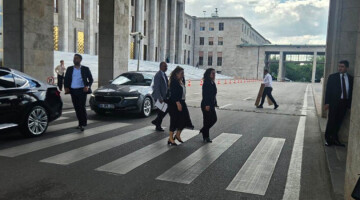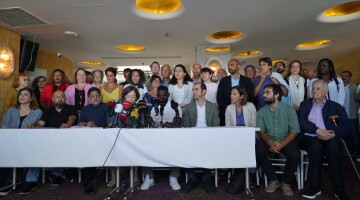The hearing of the Kobanê Case against 108 people, 18 of whom are imprisoned, continued in the Sincan Prison Campus in Ankara on Tuesday.
The hearing held by Ankara 22nd Heavy Penal Court was attended by Peoples' Equality and Democracy Party (DEM Party) MPs, lawyers from DEM Party Legal Commission, Association of Lawyers for Freedom (ÖHD), Confederation of Public Employees' Trade Unions (KESK) Co-Chair Mehmet Bozgeyik and representatives of many political parties and non-governmental organizations.
Imprisoned politicians Sebahat Tuncel, Aynur Aşan, Günay Kubilay, Bülent Parmaksız, Ali Ürküt and Nazmi Gür were present in the courtroom, while politicians held in other prisons attended the hearing via Video Conferencing System (SEGBİS).
Selahattin Demirtaş thanked everyone for the messages of condolences for his father who passed away in Amed (Diyarbakır) last Sunday. "I dedicate my defense to my father who raised 7 children by the sweat of his brow without knowing to read or write, and to all the parents,” he said.
Stating that the influence of politics in the country and in the world has decreased, Demirtaş said that Kurdish politicians are trying to highlight the transformative power of politics.
Emphasizing that "we will neither forget historical facts, nor let them be forgotten," Demirtaş said, "On the occasion of this trial, we will do our best to bring the history of humanity and the history of our peoples to light once again."
The Kurdish politician, who has been behind bars since 2016, stated the following:
"In nature, only the strong survive. We supposedly invented culture; what happened to it? Morals, virtue; what happened to them? According to culture, we are the right one. The state that you and I belong to has occupied our homeland by force. It is the state that has broken the contract of virtue, and if we are looking for a culprit here, it is not us who are actually the victims of it.
(...) There is no one left who does not slaughter one another for the sake of religion and belief. Ask ISIS members what exactly they know in the name of Islam. Or ask the lynch mobs that take to the streets, the groups that gather in front of our headquarters and leave yellow body bags (which are used for the fallen guerrillas), how aware they are of the religion and identity they are fighting for. They are not aware. They are just groups that feed themselves and try to continue their generation. They are homo-sapiens. They have nothing to do with culture. If the contract of virtue is broken, there is no way to live together, and it is not us who broke it.
We have only defended the dignity and identity of our people. We defended their right to live humanely in their own land. Our homeland is ours, our land is ours, our labour is ours. Did we occupy Ankara? Did we just go and ban the language, culture and belief of the people there? Did the Turks oppose the occupation? There were Greeks, British, Byzantines, but the Turks resisted. Why do Kurds become terrorists when they resist?"
'The Kurds will not obey'
Demirtaş also referred to the historical relations between the Kurdish and Turkish peoples and emphasized that the 80’ coup is not over yet but continues with all its institutions and mentality.
"We resist; we resist in prison, we resist in the parliament. Resistance against oppression is just and legitimate. You call for resistance for Gaza day and night. You call for a caliphate. Why is that not a crime, and why is it a crime when we call for autonomy?
There is only one solution to the Kurdish question, recognition of the Kurds as they are. As the Kurds, we do not obey. We are ready to live together, but we will resist this mentality until the end."
The hearing will continue with the defence of Demirtaş at 10.00 tomorrow morning.












